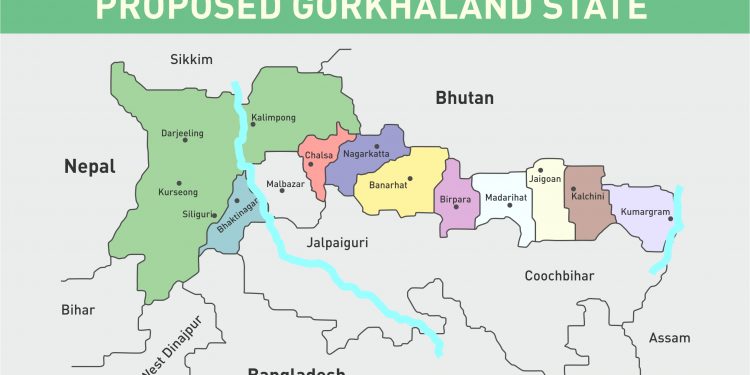Darjeeling: For the first time in about three decades, the demand for separate Gorkhaland state is not a poll issue in the Darjeeling Hills as parties, including the indigenous GJM and GNLF, are stressing on development and restoration of democracy in the region.
The statehood demand and implementation of the Sixth Schedule of the Constitution had been major poll planks in the Darjeeling Hills at various times since the beginning of the protracted Gorkhaland movement in 1986.
This time, the statehood issue has not found favour with the main opponents, the Trinamool and the BJP, and also the local outfits – GJM and GNLF – who are not in the fray but are nevertheless deciding factors in the Darjeeling Lok Sabha seat.
“The statehood is not an issue for us this time. We are stressing on overall development of the Hills, which it has been deprived of for so many years,” said Amar Singh Rai, a former Gorkha Janamukti Morcha (GJM) MLA and TMC candidate from the seat.
“Our agenda is development. For the last 10 years, the BJP MPs have done nothing for the people of the Hills,” claimed Rai, who was a staunch Gorkhaland supporter during the 104-day long strike in the Hills in 2017.
He is pitted against Raju Singh Bista of the BJP, formerly of the Gorkha National Liberation Front (GNLF), in the poll fight.
Rai’s view was echoed by leaders of the Binay Tamang faction of the GJM. They feel it would be unrealistic to fight for separate statehood by ignoring the basic needs.
Senior Trinamool leader and minister Gautam Deb feels that the statehood demand has led to development taking the backseat. “It’s time we keep aside this (statehood) issue and fight for the development of the people of hills,” Deb, who represents Dabgram-Phulbari in neighbouring Jalpaiguri district, said.
“For us statehood is not an issue. We are fighting for restoring democracy in the Hills as it is necessary to fight for a political solution to the Hill problem … The reign of terror of the police and the Binay Tamang group has to end,” BJP Darjeeling district president Manoj Dewan told this news agency.
Loksang Lama, the working president of Bimal Gurung faction of the GJM, shared similar views. “We want a political solution to the problems in the Hills,” he asserted Kalyan Dewan, a former vice-president of the GJM and a veteran of Hill politics, said this was the first time in over three decades that both the political parties and the people in the Hills have moved away from the issue of Gorkhaland.
Darjeeling had sent BJP leaders Jaswant Singh and Surinder Singh Ahluwalia to the Parliament in 2009 and 2014 respectively.
This time, the fight will be between the Trinamool, supported by Binay Tamang-led GJM faction and the BJP, supported by Bimal Gurung-led GJM faction and the GNLF.
The Trinamool, which had vehemently opposed the statehood demand, has also promised basic amenities such as drinking water, electricity, education and employment to the people.
The BJP, which was once sympathetic to the Gorkhaland demand, is stressing on restoration of democracy in the region and the end of the “reign of terror” by the police, which, it alleged, started since the 2017 agitation.
Minimum wages for tea workers and reopening of closed tea gardens are also major poll issues this time, said sources in Trinamool and BJP, the two main opponents in the battle for supremacy in Darjeeling Hills.
PTI






































